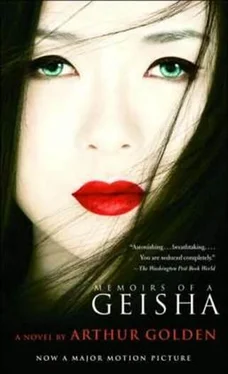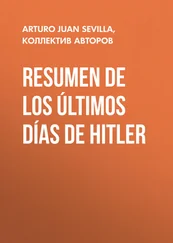“I figured I couldn’t set foot in a place like the Ichiriki in the sort of kimono I usually wear,” she said. “Most of the ones at my okiya aren’t very glamorous, though the Americans can’t seem to tell the difference.”
“If you hadn’t been so frank with us, Pumpkin,” Mameha said, “we might have thought this was your usual attire.”
“Are you kidding me? I’ve never worn a robe this beautiful in my life. I borrowed it from an okiya down the street. You won’t believe what they expect me to pay them, but I’ll never have the money, so it doesn’t make any difference, now does it?”
I could see that the Chairman was amused-because a geisha never spoke in front of a man about anything as crass as the cost of a kimono. Mameha turned to say something to him, but Pumpkin interrupted.
“I thought some big shot was going to be here tonight.”
“Maybe you were thinking of the Chairman,” Mameha said. “Don’t you think he’s a ‘big shot’?”
“He knows whether he’s a big shot. He doesn’t need me to tell him.”
The Chairman looked at Mameha and raised his eyebrows in mock surprise. “Anyway, Sayuri told me about some other guy,” Pumpkin went on.
“Sato Noritaka, Pumpkin,” the Chairman said. “He’s a new Deputy Minister of Finance.”
“Oh, I know that Sato guy. He looks just like a big pig.”
We all laughed at this. “Really, Pumpkin,” Mameha said, “the things that come out of your mouth!”
Just then the door slid open and Nobu and the Minister entered, both glowing red from the cold. Behind them was a maid carrying a tray with sake and snacks. Nobu stood hugging himself with his one arm and stamping his feet, but the Minister just clumped right past him to the table. He grunted at Pumpkin and jerked his head to one side, telling her to move so he could squeeze in beside me. Introductions were made, and then Pumpkin said: “Hey, Minister, I’ll bet you don’t remember me, but I know a lot about you.”
The Minister tossed into his mouth the cupful of sake I’d just poured for him, and looked at Pumpkin with what I took to be a scowl.
“What do you know?” said Mameha. “Tell us something.”
“I know the Minister has a younger sister who’s married to the mayor of Tokyo,” Pumpkin said. “And I know he used to study karate, and broke his hand once.”
The Minister looked a bit surprised, which told me that these things must be true.
“Also, Minister, I know a girl you used to know,” Pumpkin went on. “Nao Itsuko. We worked in a factory outside Osaka together. You know what she told me? She said the two of you did ‘you-know-what’ together a couple of times.”
I was afraid the Minister would be angry, but instead his expression softened until I began to see what I felt certain was a glimmer of pride.
“She was a pretty girl, she was, that Itsuko,” he said, looking at Nobu with a subdued smile.
“Why, Minister,” Nobu replied, “I’d never have guessed you had such a way with the ladies.” His words sounded very sincere, but I could see the barely concealed look of disgust on his face. The Chairman’s eyes passed over mine; he seemed to find the whole encounter amusing.
A moment later the door slid open and three maids came into the room carrying dinner for the men. I was a bit hungry and had to avert my eyes from the sight of the yellow custard with gingko nuts, served in beautiful celadon cups. Later the maids came back with dishes of grilled tropical fish laid out on beds of pine needles. Nobu must have noticed how hungry I looked, for he insisted I taste it. Afterward the Chairman offered a bite to Mameha, and also to Pumpkin, who refused.
“I wouldn’t touch that fish for anything,” Pumpkin said. “I don’t even want to look at it.”
“What’s wrong with it?” Mameha asked.
“If I tell you, you’ll only laugh at me.”
“Tell us, Pumpkin,” Nobu said.
“Why should I tell you? It’s a big, long story, and anyway nobody’s going to believe it.”
“Big liar!” I said.
I wasn’t actually calling Pumpkin a liar. Back before the closing of Gion, we used to play a game we called “big liar,” in which everyone had to tell two stories, only one of which was true. Afterward the other players tried to guess which was which; the ones who guessed wrong drank a penalty glass of sake.
“I’m not playing,” said Pumpkin.
“Just tell the fish story then,” said Mameha, “and you don’t have to tell another.”
Pumpkin didn’t look pleased at this; but after Mameha and I had glowered at her for a while, she began.
“Oh, all right. It’s like this. I was born in Sapporo, and there was an old fisherman there who caught a weird-looking fish one day that was able to speak.”
Mameha and I looked at each other and burst out laughing.
“Laugh if you want to,” Pumpkin said, “but it’s perfectly true.”
“Now, go on, Pumpkin. We’re listening,” said the Chairman.
“Well, what happened was, this fisherman laid the fish out to clean it, and it began making noises that sounded just like a person talking, except the fisherman couldn’t understand it. He called a bunch of other fishermen over, and they all listened for a while. Pretty soon the fish was nearly dead from being out of the water too long, so they decided to go ahead and kill it. But just then an old man made his way through the crowd and said he could understand every single word the fish was saying, because it was speaking in Russian.”
We all burst out laughing, and even the Minister made a few grunting noises. When we’d calmed down Pumpkin said, “I knew you wouldn’t believe it, but it’s perfectly true!”
“I want to know what the fish was saying,” said the Chairman.
“It was nearly dead, so it was kind of… whispering. And when the old man leaned down and put his ear to the fish’s lips-”
“Fish don’t have lips!” I said.
“All right, to the fish’s… whatever you call those things,” Pumpkin went on. “To the edges of its mouth. And the fish said, ‘Tell them to go ahead and clean me. I have nothing to live for any longer. The fish over there who died a moment ago was my wife.’ ”
“So fish get married!” said Mameha. “They have husbands and wives!”
“That was before the war,” I said. “Since the war, they can’t afford to marry. They just swim around looking for work.”
“This happened way before the war,” said Pumpkin. “Way, way before the war. Even before my mother was born.”
“Then how do you know it’s true?” said Nobu. “The fish certainly didn’t tell it to you.”
“The fish died then and there! How could it tell me if I wasn’t born yet? Besides, I don’t speak Russian.”
“All right, Pumpkin,” I said, “so you believe the Chairman’s fish is a talking fish too.”
“I didn’t say that. But it looks exactly like that talking fish did. I wouldn’t eat it if I was starving to death.”
“If you hadn’t been born yet,” said the Chairman, “and even your mother hadn’t been born, how do you know what the fish looked like?”
“You know what the Prime Minister looks like, don’t you?” she said. “But have you ever met him? Actually, you probably have. Let me pick a better example. You know what the Emperor looks like, but you’ve never had the honor of meeting him!”
“The Chairman has had the honor, Pumpkin,” Nobu said.
“You know what I mean. Everybody knows what the Emperor looks like. That’s what I’m trying to say.”
“There are pictures of the Emperor,” said Nobu. “You can’t have seen a picture of the fish.”
“The fish is famous where I grew up. My mother told me all about it, and I’m telling you, it looks like that thing right there on the table !”
Читать дальше












